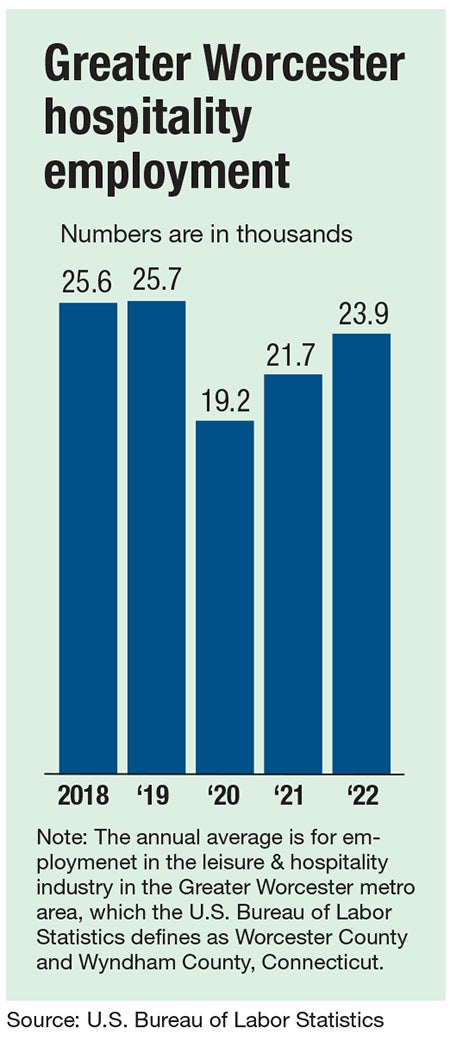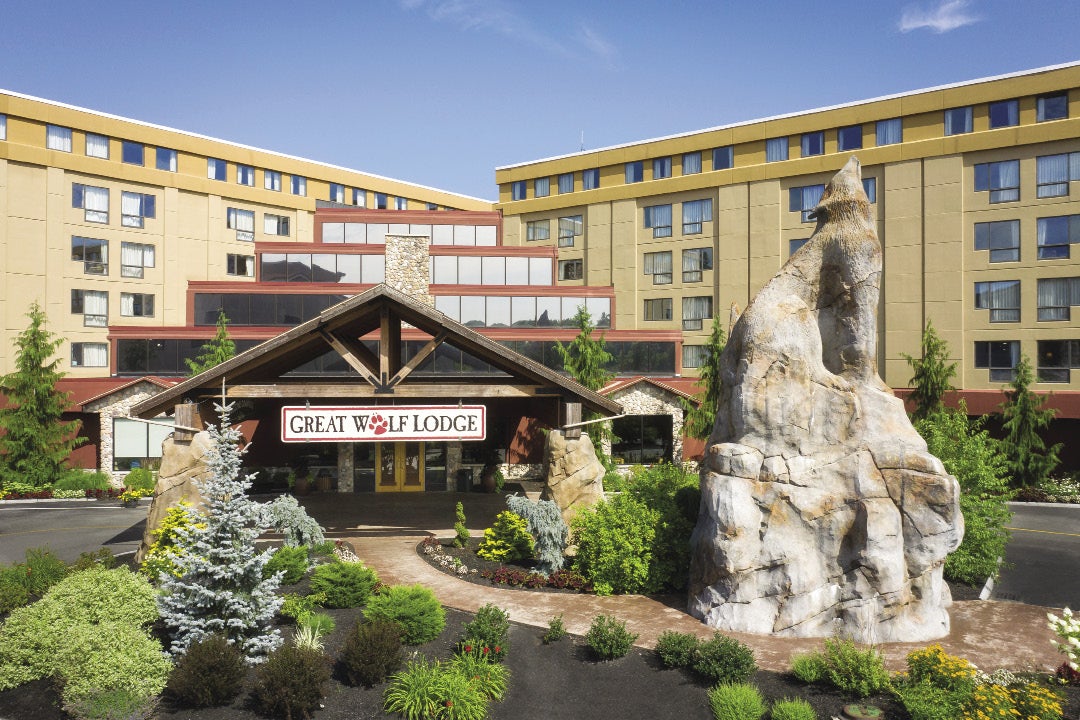New workforce data and industry leaders in Central Massachusetts suggest any inkling that people wouldn’t travel or meet at the same rates as they did before COVID appears to be unfounded.
Get Instant Access to This Article
Subscribe to Worcester Business Journal and get immediate access to all of our subscriber-only content and much more.
- Critical Central Massachusetts business news updated daily.
- Immediate access to all subscriber-only content on our website.
- Bi-weekly print or digital editions of our award-winning publication.
- Special bonus issues like the WBJ Book of Lists.
- Exclusive ticket prize draws for our in-person events.
Click here to purchase a paywall bypass link for this article.
During the height of the COVID-19 pandemic, questions arose about how the new way of conducting businesses – mostly virtually – would reshape how things were done well into the future.
That question had larger implications for some industries than others, and the hospitality sector was among those at the top of the list.
Yet, new workforce data and industry leaders in Central Massachusetts suggest any inkling that people wouldn’t travel or meet at the same rates as they did before COVID appears to be unfounded.
“I would say the lion’s share of people still want to get together: break bread, have a cocktail,” said Steve Gardiner, general manager of the Southbridge Hotel and Conference Center for the last seven years.

With a return to in-person meetings – and sleeping and eating – for business people, a major challenge has been to ratchet staff levels back up to meet the demand for services. Thankfully for Gardiner and his hospitality industry colleagues, that tall order seems to be on its way to fulfillment.
In 2022, the leisure and hospitality workforce in the Greater Worcester metro area rose to an 23,925 average for year, closing in on the pre-pandemic level of 25,700 set in 2019, according to the U.S. Bureau of Labor Statistics. BLS defines the metro area as Worcester County and Wyndham County, Connecticut.
Hotels and motels in Central Massachusetts will see the largest growth in employment levels of any industry subset between 2020 and 2030, according to the Massachusetts Executive Office of Labor and Workforce Development. This is largely driven by COVID-19, which shuttered such establishments for months early in the pandemic, necessitating the need for steep employment growth.
This subset of the hospitality sector in the region is expected to employ more than 2,100 by 2030, an increase of nearly 200% from 2020.
More and better applicants

Anecdotally, the numbers ring true, or at least Gardiner and other leaders in the hospitality industry hope they will. Gardiner said the labor pool is still in desperately short supply, but it’s getting better.
Hotel occupancy gradually improved after initial closures in the spring 2020. After a dramatic uptick in business in the spring 2022, Gardiner said it was a daily struggle to adequately staff the hotel and conference center. Employees could rarely take a Saturday off. Now, with fewer open positions, the applications he receives tend to be stronger. He’s buoyed the management team with well-qualified hires, and people can request the odd day off.
“We’re trying to get to a point where we can overstaff with management and our line-level staff,” Gardiner said.
Hiring coming out of the pandemic hasn’t been easy and, like others, hospitality executives have had to think harder about how to make jobs more attractive. Average wages have surged,, something the American Hotel and Lodging Association has underscored.
As hotel occupancy approaches the pre-pandemic high of 70%, state and local tax revenue is increasing, with Massachusetts ranking seventh in revenue growth, according to an AHLA article published in February in its publication, Lodging.
“To continue growing, we need to hire more people. Fortunately, there’s never been a better time to be a hotel employee, with wages, benefits, flexibility, and upward mobility better than ever,” AHLA President and CEO Chip Rogers said.
AHLA cited a median industry wage of $23 per hour, while the U.S. Bureau of Labor Statistics reported an average hourly wage of $20.78 in January, up nearly $4 per hour since January 2020.
At Great Wolf Lodge New England, the indoor waterpark and hotel opened nine years ago in Fitchburg, reaching out to potential candidates is a constant effort, mainly done through job fairs. But keeping them is the trick. Bonuses of up to $500 are offered to people who refer employees who stay and wages are constantly studied and increased when needed.

“Retention is our No. 1 goal,” said Great Wolf New England General Manager Henry Tessman, who noted the majority of its employees returned the hotel opted to close for 15 months after COVID-19 made operating the waterpark difficult.
Tessman admits that Great Wolf is in a unique position, drawing workers from nearby Fitchburg State University and Mount Wachusett Community College in Gardner. There’s a built-in labor pool, so even if the hotel is light on staffing, it’s less pronounced than the industry average.
Immigration quagmire
Elsewhere, staffing problems are affected by a longstanding political football: immigration. Hospitality and tourism have long attracted seasonal workers to the U.S., and those hold a Permanent Resident Card (or Green Card). But policies that reduced the number of foreign-born workers entering the U.S. under the President Donald Trump Administration, plus a moratorium on international travel during the pandemic, reduced the flow of workers, according to a report by Goldman Sachs Research in the spring of 2022.
The hospitality industry, including the AHLA, has called for immigration reform to bolster the workforce. In particular, the group is pushing for legislation to strengthen the H2-B and J-1 visa programs, which have been the major avenues for foreign-born workers to come to the U.S. to work legally.
Gardiner said it’s been very difficult to get such visa applications approved post-COVID. Pointing to a low U.S. unemployment rate, he insisted immigration reform will only benefit the U.S. labor market.
Regardless of the fate of immigration reform, which seems unlikely with the state of politics in Washington, D.C., the hospitality industry will expand its footprint, as it has always done. Great Wolf Lodge, for example, announced plans to open a second New England location at Foxwoods Resort Casino in Mashantucket, Connecticut in 2025.
“There’s always a developing pipeline, and this creates tremendous tax revenue,” said Paul Sacco, president and CEO of the Massachusetts Lodging Association. Sacco said momentum is building for business meetings and accommodations, and hotel managers are up to the task.
“We’re starting to see the light, but it’s going to take us another year or year-and-a-half to get back to proper staffing levels in line with occupancy levels,” Sacco said.

